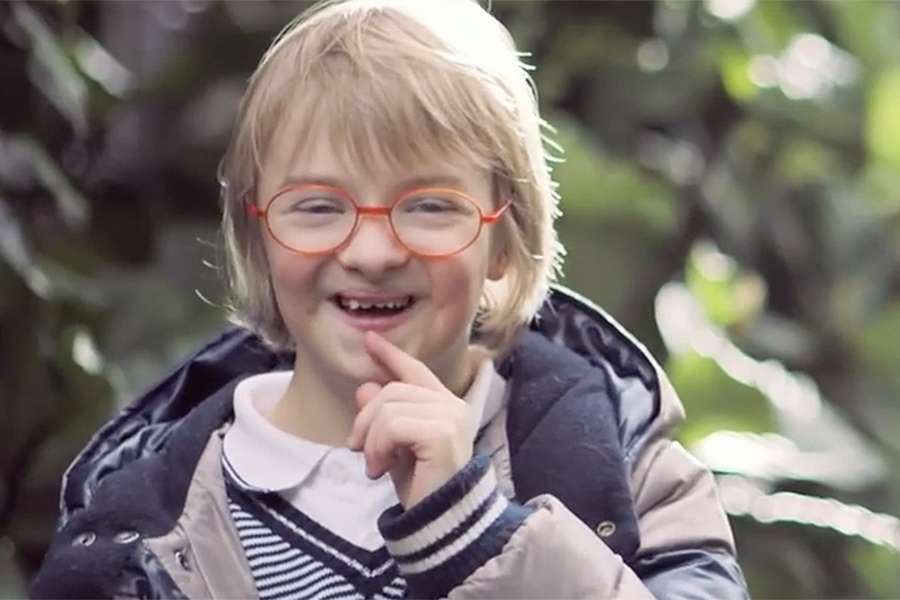Paris, France, Nov 23, 2016 / 02:23 pm (CNA/EWTN News).- A French court has drawn international backlash for ruling that a popular video showing happy children with Down syndrome was “inappropriate” for French television.
“It’s so absurd. I have never heard of a ruling so egregious,” said Michelle Sie Whitten, president and CEO of the Global Down Syndrome Foundation. She called the decision “shocking” and “offensive,” adding that it “flies in the face of freedom of speech.”
The video in question, entitled “Dear Future Mom,” was released in 2014 for World Down Syndrome Day and has received more than 7 million viewers online alone. It shows children with Down syndrome from around the world reassuring a mother whose child has received a diagnosis. The children tell her that her child “can be happy — just like I am” and reinforce what they are able to do and accomplish.
On Nov. 10, the French Council of State, a body of the French government, ruled that the short video was inappropriate for broadcast on French television as a commercial.
In a decision upholding the French Broadcasting Council’s earlier ban of the video, the Council of State said it failed to meet the criteria for a public service announcement. In its reasoning, it pointed out that the happiness of the children shown in the video was “likely to disturb the conscience of women who had lawfully made different personal life choices.” The Council of State only banned the film as a commercial or announcement, and said it would not ban the video from broadcast in other forms.
Sie Whitten told CNA that the alarming decision should be overturned immediately. “We need to stand up to this,” she urged. “We need to join the people in France who understand that is a slippery slope.”
Down syndrome, also known as Trisomy 21, is a genetic condition where a child is born with an extra copy of the 21st chromosome. It is typically associated with intellectual disabilities, delays and abnormalities in physical growth, and other concurrent medical issues.
Due to the high rate of prenatal screening, as many as nine out of ten children diagnosed with Down syndrome in utero are aborted. However, advances in care for people with Down syndrome has raised the life expectancy and quality of life for children born with the condition.
A 2011 study found that 99 percent of people with Down syndrome report being happy with their life, higher than surveys of the general public.
The French video was produced, along with other organizations, by the Jerome Lejeune Foundation, which appealed the original ban by French Broadcasting Council. The organization will now appeal the decision at the European Court of Human Rights. Jean-Marie Le Mene, president of the Jerome Lejeune Foundation in France, criticized the court’s ruling in a statement, saying that the decision puts the destruction and protection of human life on the same plane “as if the two acts had the same value.”
“Indeed, experience shows that women who have given birth to a child with a disability do not regret having chosen life,” Le Mene stated. He further criticized the decision as removing “happy Down syndrome children from view.” This position of the court, he continued, asks people to “consider whether the freedom of expression of people with Down syndrome should bow down in favor of the right to abortion.”
Dr. Monica Lopez Barahona, president of the Jerome Lejeune Foundation, in Spain also commented on the situation, saying that the video campaign was created “to help families with a child with Down syndrome, to show that these children can be as happy as any.”
The Jerome Lejeune Foundation is an international organization founded by friends and colleagues of Professor Jerome Lejeune, the French scientist who is widely considered the father of modern medical genetics. Lejeune discovered the genetic causes of Down syndrome in 1958, the first discovery of a chromosomal anomaly. An ardent Catholic, he worked for the rest of his life against the use of prenatal testing to target unborn children with the condition for abortion. He was named by Pope Saint John Paul II as the first president of the Pontifical Academy for Life in 1994. His cause for canonization is open.

